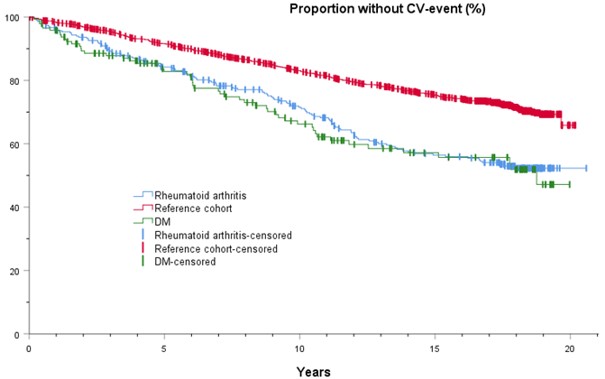Session Information
Date: Saturday, November 6, 2021
Title: RA – Diagnosis, Manifestations, & Outcomes Poster I: Cardiovascular Pulmonary Disease (0268–0295)
Session Type: Poster Session A
Session Time: 8:30AM-10:30AM
Background/Purpose: Patients with rheumatoid arthritis have an increased risk for developing cardiovascular diseases (CVD) compared to the general population, similar to the CVD risk in patients with diabetes mellitus (DM). However, there are no controlled studies investigating the incidence of cardiovascular (CV) events in RA patients with follow up of more than 20 years.
The objectives of the current study were to investigate the incidence rates of CV events in a long-term follow up cohort of RA patients, and to compare these to a similar cohort representing the general population, ie. The Hoorn study.
Methods: The CARRÉ study is an ongoing prospective cohort study, which started in 2001, investigating CV mortality and morbidity in 353 randomly selected patients with RA. Primary endpoints, i.e. verified medical history of coronary, cerebral or peripheral arterial disease, were determined at baseline, and after three, ten, fifteen and twenty years of follow up. Patients were censored at the date of an experienced CV event or their death. Incidence density rates per 100 patient years were calculated. Data were compared to results from the Hoorn study, a Dutch cohort study of glucose metabolism and other CV risk factors that began in 1989. All participants were subject to an extensive and repeated CV screening program similar to that used in the CARRÉ study. 1.356 nondiabetic controls and 144 patients with DM were used in the comparison.
Results: During follow up, 122 (35%) of RA patients developed a CV event, compared to 353 (26%) of the general population and 53 (37%) of the DM patients. The incidence rate of CV events in RA patients was 3.1 per 100 patient years, with 3.915 years at risk, compared to 1.9 per 100 patient years in the general population and 3.9 per 100 patient years in the DM patients, with 18.791 and 1.374 years at risk, respectively. CV event-free survival is shown in figure 1.
Conclusion: The incidence rate of CV events in RA patients has during 20 years remained consistently higher compared to the general population. The rate of CV events in RA patients has remained the same, despite better control of inflammation, suggesting under-treatment of “traditional” CV risk factors. This again emphasizes the need for timely CVD-risk screening and management
To cite this abstract in AMA style:
Raadsen R, Agca R, Voskuyl A, Boers M, Lems W, van Kuijk A, Nurmohamed M. 20 Years Follow-up of Cardiovascular Event Risk in Rheumatoid Arthritis Compared to Diabetes [abstract]. Arthritis Rheumatol. 2021; 73 (suppl 9). https://acrabstracts.org/abstract/20-years-follow-up-of-cardiovascular-event-risk-in-rheumatoid-arthritis-compared-to-diabetes/. Accessed .« Back to ACR Convergence 2021
ACR Meeting Abstracts - https://acrabstracts.org/abstract/20-years-follow-up-of-cardiovascular-event-risk-in-rheumatoid-arthritis-compared-to-diabetes/

